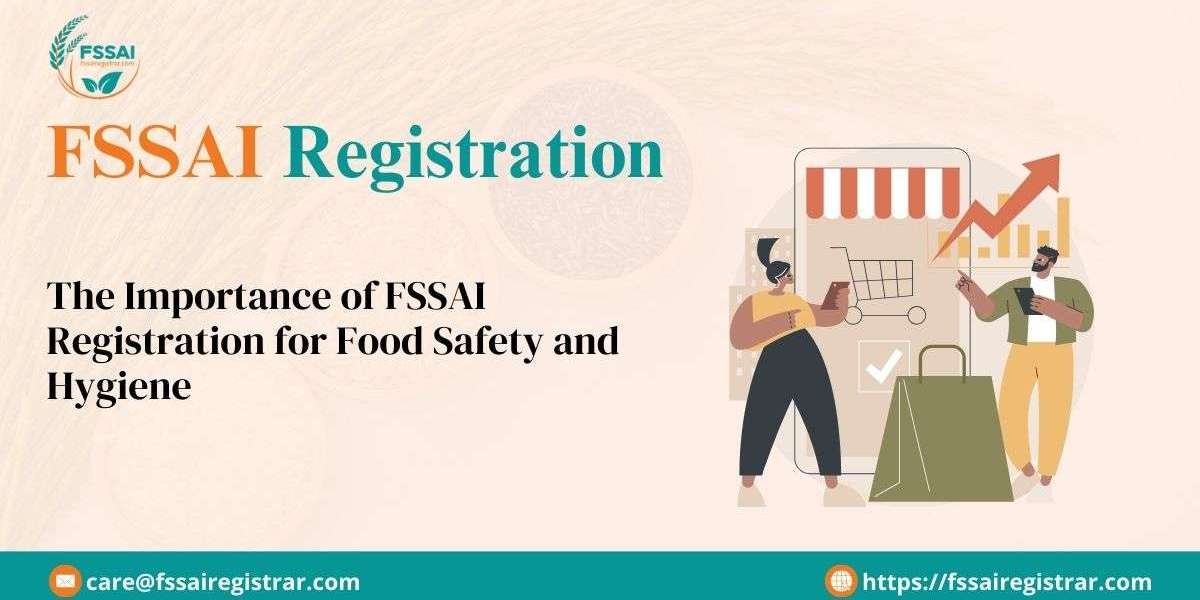Food safety and hygiene are critical aspects of public health, and ensuring that food consumed by the masses is safe is of paramount importance. The Food Safety and Standards Authority of India (FSSAI) was established under the Food Safety and Standards Act, of 2006, to regulate food safety in India. FSSAI registration is a mandatory requirement for all food businesses operating in the country, from small-scale vendors to large multinational corporations. This registration serves as a guarantee that the food products being offered adhere to the standards set by the authority, ensuring they are safe for consumption.
In this article, we will explore the significance of FSSAI registration in maintaining food safety and hygiene, and why it is essential for food business operators (FBOs).
Ensures Compliance with Legal Standards
One of the primary reasons why FSSAI registration is essential is that it ensures food businesses comply with the legal standards set by the government. FSSAI has established comprehensive guidelines that cover various aspects of food safety, including preparation, handling, storage, and transportation of food items. By adhering to these standards, food businesses minimize the risk of contamination, adulteration, and the sale of substandard food products. Failure to comply with these standards can lead to severe penalties, including fines, suspension of business operations, and even legal action.
For consumers, FSSAI registration serves as a mark of trust, as it assures them that the food they consume meets strict safety and quality standards. This legal framework not only protects public health but also promotes ethical business practices in the food industry.
Promotes Food Hygiene Practices
Food hygiene is a crucial aspect of food safety. FSSAI registration mandates food businesses to follow strict hygiene protocols, from the sourcing of raw materials to the final delivery of food products. This includes ensuring that food preparation areas are clean, food handlers are trained in hygiene practices, and that proper storage facilities are available to prevent contamination.
For instance, FSSAI requires food businesses to use clean water, maintain proper sanitation in kitchens, and avoid cross-contamination between raw and cooked foods. These measures reduce the risk of foodborne illnesses, which are often caused by poor hygiene practices.
In addition, FSSAI registration encourages regular inspections and audits of food establishments to ensure that hygiene standards are maintained consistently. This continuous monitoring helps identify and rectify potential risks before they escalate into serious public health concerns.
Enhances Consumer Confidence
In today’s health-conscious world, consumers are increasingly concerned about the safety and quality of the food they consume. FSSAI registration acts as a seal of approval that reassures consumers about the safety and quality of food products. When a food product bears the FSSAI logo and registration number, it signifies that the product has undergone rigorous testing and meets the prescribed safety standards.
This boost in consumer confidence is vital for food businesses, as it helps build a loyal customer base and enhances the credibility of the brand. Consumers are more likely to trust and purchase products from businesses that are FSSAI registered, as they know that these businesses are accountable to the government’s regulatory body.
Furthermore, FSSAI registration helps food businesses gain a competitive edge in the market. With consumers actively seeking safe and high-quality food products, businesses that prioritize food safety and hygiene are more likely to stand out and attract customers.
Facilitates International Trade
FSSAI registration is not only for domestic food businesses but also for those involved in international trade. Many countries have strict food safety regulations, and importing food products from countries with poor safety records can be a risky endeavor. By obtaining FSSAI registration, Indian food businesses demonstrate their commitment to maintaining high food safety standards, which makes it easier for them to export their products to foreign markets.
FSSAI’s stringent food safety guidelines align with global food safety practices, which helps Indian food products meet international quality benchmarks. This facilitates smoother export procedures, reduces the likelihood of rejection at international borders, and enhances the global reputation of Indian food products.
Minimizes Food Adulteration and Fraud
Food adulteration and fraud are significant problems in the food industry, with unscrupulous businesses often resorting to unethical practices to increase profits. Adulteration not only compromises the quality of food but can also pose serious health risks to consumers. FSSAI registration is a key tool in the fight against food adulteration, as it sets strict guidelines for food purity and ensures that businesses are held accountable for the quality of their products.
FSSAI conducts regular inspections and sampling of food products to detect any instances of adulteration. Businesses found to be involved in such practices face severe penalties, including cancellation of their FSSAI registration. This regulatory oversight helps create a level playing field in the food industry and ensures that consumers have access to safe and unadulterated food.
Encourages Transparency and Accountability
FSSAI registration fosters transparency and accountability in the food business ecosystem. Food businesses are required to display their FSSAI registration number on packaging, menus, and advertisements. This transparency allows consumers to easily verify whether a business is registered and compliant with food safety standards.
Additionally, FSSAI maintains a public database of registered food businesses, which consumers and other stakeholders can access. This open access to information promotes accountability, as businesses are aware that their operations are being monitored by both regulatory authorities and the public.
Supports Public Health Initiatives
FSSAI registration plays a vital role in supporting public health initiatives by ensuring that the food consumed by the masses is safe and nutritious. FSSAI regularly conducts awareness campaigns to educate food business operators and consumers about the importance of food safety and hygiene. These campaigns emphasize the need for proper food handling, storage, and preparation practices to prevent foodborne illnesses.
Moreover, FSSAI works closely with other government bodies to implement food safety regulations that protect vulnerable populations, such as children, the elderly, and those with compromised immune systems. By promoting safe food practices, FSSAI helps reduce the burden of foodborne diseases and contributes to the overall well-being of society.
Note: Click here to re-register your Fssai certificate today - RENEW FOOD LICENSE CERTIFICATE
Conclusion
FSSAI registration is essential for ensuring food safety and hygiene in India. It provides a legal framework that compels food businesses to comply with safety standards, promotes hygiene practices, enhances consumer confidence, facilitates international trade, and combats food adulteration. By obtaining FSSAI registration, food businesses not only protect public health but also enhance their credibility and competitiveness in the market. In a world where food safety concerns are on the rise, FSSAI registration acts as a crucial safeguard that ensures the food we consume is safe, nutritious, and of high quality.








